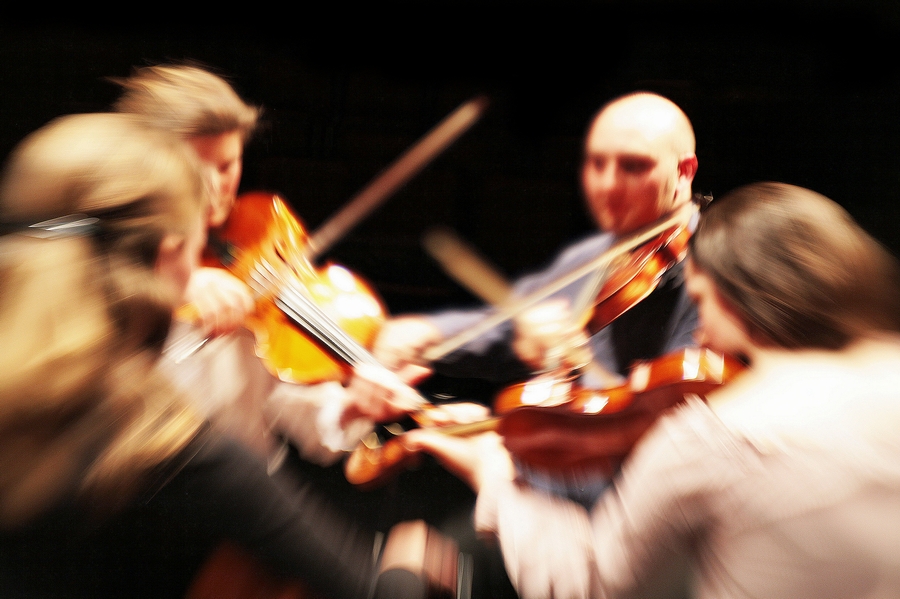Methera concert review
When the capacity audience first walked into Appleby’s Public Hall last Sunday night for North Westmorland Art’s concert by string quartet “Methera”, they will have realised that something different was ahead of them. The normal serried rows of stage-facing chairs had been replaced with a raised platform in the middle of the hall’s floor and the seating arranged “in the round”, facing inwards.
House lights off, the four young musicians were huddled in a tight circle facing in towards each other; picked out by overhead spotlights, the warm colours of their instruments were glowing in the surrounding dark. No music stands cluttered the stage, as the notes were already secure in their heads allowing a level of musical focus that was immediately obvious before a note had been sounded. And then they started to play. This is an ensemble of classically-trained string players performing traditional music within the setting of a standard string quartet and so, once their bows are moving, the first impact they make on their audiences is probably the quality of sound that they produce. That first note was so special it just set the tone for the rest of the evening. Gorgeous tones, sometimes dramatic and other times subtle use of dynamics, an innate musicality all came together to delight the audience for nigh on two hours. An interesting sense of theatre was clear too, the finishing flourish of the four instruments’ bows frequently stabbing out into the dark with precisely the same trajectories and the even group’s acknowledging bows to the audience started back-to-back, facing outwards like duellists, turning what might have otherwise been a mere formality into a little artwork in itself.
Probably a good half of the programme was composed by Methera’s own musicians and the pieces invariably used some fascinating counter melodies and harmonies that at times had a Bartok-like quality to them, harmonies that took time to resolve, moving in from what appeared to be uncompromising stand-offs, only to slide into compliance with each other from an unexpected angle. One minute, the sonorous ‘cello of Lucy Deakin was providing that stoical role of the group’s metronome but the next, she was plucking out pure funk, developing a rhythmical theme that struck out against the activities of her fellow musicians, giving them something to react to and to counter. Freed from having to follow the notes on a score in front of them, the four were able to switch their focus around within their circle, engaging with whoever might have the theme, transferring it like a relay baton from one to another. Always smiling, always animated and the audience apparently hooked as they gazed inwards onto this private, sometimes risky musical party.
Emma Reid (fiddle) revealed to the audience her semi-Swedish pedigree, but the give-away traces can be picked out in her compositions, an interesting brooding quality that hints at the Norse and the dark forests of Sweden. Evidence of the contemporary elements in their inspiration were evident in a piece by John Dipper in which the lyrical embodiment of a serene appraisal of the carpet of Oxfordshire lying beneath a local viewpoint is rudely shaken by the looming into view of Didcot Power Station, discordant double-stopping heralding the precise moment of the encounter.
The end of the concert came all too swiftly, but the thunderous undying applause swiftly turned into an extraordinary unison clap - much as one might hear anywhere East of Berlin – which the quartet could ignore no longer.
Their final return to the stage was to deliver another home-grown piece as an encore, this time written by viola-playing Miranda Rutter. Entitled ‘1st September’ it portrayed a languid boat trip down the River Thames whilst Sand Martins swooped low over the water, dipping to pluck flies from the surface. The imagery was just fabulous and was a cleverly-pitched bedtime lullaby to send the concert goers home utterly contented and feeling thoroughly entertained.
Three more concerts remain in this season’s programme for North Westmorland Arts (www.appleby-concerts.org.uk) and the next is baroque ensemble ‘Consort 1700’ on Sunday 30th January 2011 at 7:30pm. For more details contact NWA secretary Clare Morton on 017684 83777.